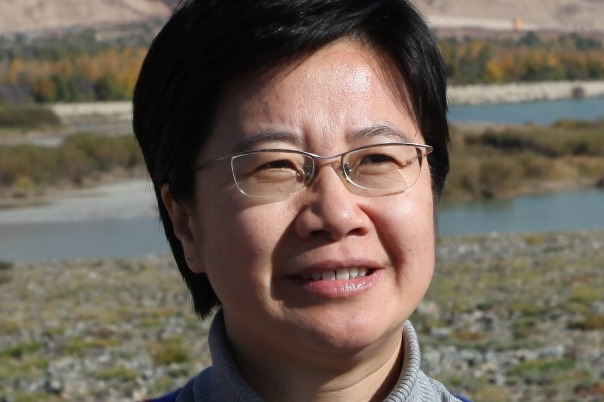Scholar turns passion for past into lessons for today

Fascinated by the open-mindedness and confidence of the Tang era, Yu Gengzhe developed a deep interest in history, and particularly in the Tang Dynasty (618-907), at an early age.
"It's difficult to say when or why I became interested in history. It's like having certain favorite dishes," Yu said. "It's a great pleasure to learn history in a country with so much of it. I feel connected to ancient people when I read their stories."
Born in 1971 in Shaanxi province, Yu was brought up in the city of Xianyang, the former capital of the Qin Dynasty (221-206 BC), the first dynasty to unite China.
At 19, he enrolled in the history department at the Shaanxi Normal University after taking the gaokao (China's university entrance exam) and has been studying, researching and teaching history ever since.
"Studying history can teach us more about ourselves and help us master the complexities of human nature and society," he said.
From Yu's perspective, Tang China had a unique charm. The dynasty had a glorious culture, and people of different ethnicities were living together for the first time. It was a society of diversity.
Years of researching figures from the period, including poet Li Bai, Di Renjie, a court official under Empress Wu Zetian, and Shangguan Wan'er, a high-ranking female official in the reign of Emperor Gaozong, Yu discovered that the Tang were not shy about expressing their true feelings, and were not wary of judgment.
"Tang China was not uniform. People had different characters, they were not all the same," Yu said.
In 2012, he was invited to lecture on Baijia Jiangtan, a TV program produced by China Central Television in which professors from different disciplines present their subjects to an audience.
Contrary to the image of the history professor, sitting in the library and examining old archives, Yu is good at making use of the internet and the digital world.
"Times have changed. Now people watch TV programs to learn and become informed," he said. Teaching in the classroom is still Yu's main job, but he also posts videos on social media platforms to share his opinions as an historian.
He has accounts on Weibo, Douyin, Xigua Video and Bilibili-all widely-used social media platforms in China. His lectures are vivid, and the topics he chooses cater to popular interests. For instance, Yu has discussed how people rented lodgings during the Tang Dynasty, how they avoided getting pregnant and how many days they had off work.
Yu's Weibo account has 590,000 followers, and on Bilibili, he has nearly 240,000 fans.
"I feel obliged to give back to society, and sharing knowledge about China's past is my mission," he said. "As historians, we not only teach historical facts, we also teach how to look at history. We need to think from the perspective of those learning from us so they are better able to understand the past."
Yu is engaged in two fields of research: people and society during the Sui (581-618) and Tang dynasties, and the medical history of ancient China.
In August, his latest academic publication, Sensing Illness: Revisiting Medicine and Society in Medieval China, reached the public just as the COVID-19 pandemic was reshaping the world.
In the book, he outlined the patient-doctor relationship during the Han (206 BC-AD 220) and Song (960-1279) dynasties, the medical systems and institutions of medieval China, and sexually transmitted diseases.
"From COVID-19, we know that disease has an impact on human history. I don't think it will reverse globalization. We are able to cope with this disease together," he said.
The message he wants to deliver is simple.
"History is a discipline of facts. Historians not only teach facts, but also the ability to understand history fairly and peacefully."
Xin Wen contributed to this story.
- China announces top journalism award winners
- Party plenum: Charting the course for the 15th Five-Year Plan period (2026-30)
- China postpones Shenzhou XX return mission
- Chinese authorities call for broader AI application in health sector
- HKU leads as 5 Hong Kong universities make Asia's top 10 in QS rankings
- Historians on both sides of Taiwan Strait urge defense of historical truth of Taiwan's restoration




































